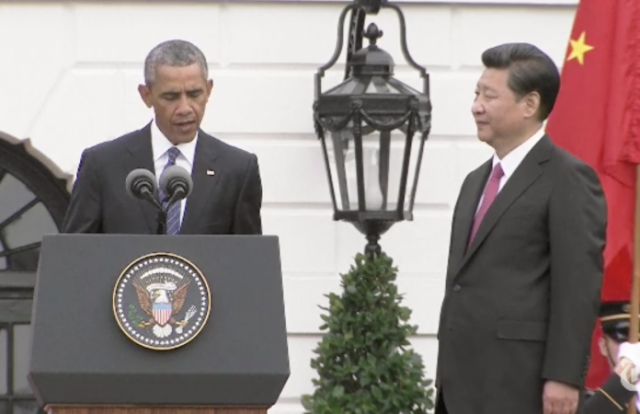After U.S. Urging, China Quietly Arrests Hackers
Sincere action or a move to stave off economic sanctions?

The Washington Post reported Friday afternoon that China arrested a handful of hackers at the American government’s urging. The move would is a first for the Chinese and may be indicative of cooperation between the two governments.
As we’ve discussed before, conventional wisdom holds the Chinese responsible for the massive OPM hacking, though the Obama administration refused to publicly blame China.
Citing concerns over national security, the Obama Administration has decided that they will not publicly blame China for the hack, even though conventional wisdom (and a fair amount of now-public evidence) suggests that they were responsible. Officials fear that coming out in an official capacity against Beijing will compromise what evidence investigators have been able to assemble.
More from WaPo:
“We have chosen not to make any official assertions about attribution at this point,” said a senior administration official, despite the widely held conviction that Beijing was responsible. The official cited factors including concern that making a public case against China could require exposing details of the United States’ own espionage and cyberspace capabilities. The official was among several who spoke on the condition of anonymity to describe internal deliberations.
…
U.S. officials stressed that the administration has not ruled out economic sanctions or other punitive measures for the OPM breach. “We’re still teeing up options” for Obama and his national security team, a second U.S. official said.
The senior administration official said that the government could impose new sanctions on China without publicly linking it to the attack, and “then send a private message that said, ‘Oh, and by the way, part of the reason for this is OPM.’ ”
The administration has not publicly or officially blamed China for the attack, but during Chinese President Xi JinPing’s White House visit, President Obama made note of cybertheft.
In August, the disclosure that Chinese cyber spies had been eavesdropping on top U.S. official’s email accounts, only exacerbated security concerns.
A few weeks ago, the Chinese President visited the White House where both he and President Obama addressed the ongoing cybersecurity threat:
President Obama said Friday that he had reached a “common understanding” with President Xi Jinping of China to combat “cyber-enabled theft of intellectual property,” but made it clear that wide areas of disagreement remained over how to stop an escalation of Chinese cyberthefts and the possibility of an American response.
Noticeably absent from the public discussion was any mention of cyberespionage.
According to the Washington Post, the U.S. government passed along an arrest wish list.
The arrests come amid signs of a potential change in the power balance between the U.S. and Chinese governments on commercial cyberespionage, one of the most fraught issues between the two countries. For years, U.S. firms and officials have said Beijing hasn’t done enough to crack down on digital larceny. Experts estimate that Chinese industrial hacking costs U.S. firms tens of billions of dollars annually.
In recent weeks, U.S. intelligence and law enforcement agencies drew up a list of the hackers the United States wanted arrested.
“We need to know that you’re serious,” was the way one individual familiar with the matter described the message. “So we gave them a list, and we said, ‘Look, here’s these guys. Round them up.’”
Now, administration officials are watching to see if China will follow through with prosecutions. A public trial is important not only because that would be consistent with established principles of criminal justice, but because it could discourage other would-be hackers and show that the arrests were not an empty gesture.
Administration officials say they are not sure whether the arrests mark a deeper shift in China’s stance — or whether they were a short-term move to avoid getting hit by sanctions.
“You’d want to see it sustained over time,” said one U.S. official, who, like several others, spoke on the condition of anonymity because of the matter’s sensitivity. “And in a situation when there wasn’t a major state visit coming up. That will be the proof that the cooperation really is improving.”
A sincere shift or a symbolic move to quell the approaching storm? I suppose we’ll have to wait and see.
Follow Kemberlee on Twitter @kemberleekaye
 DONATE
DONATE
Donations tax deductible
to the full extent allowed by law.








Comments
China will pretend to take action, and Obama will pretend to believe them.
yep, what’s Chinese for, “Round up the usual suspects”?
China DID take action.
They rounded up some great talent and now have them locked in an underground bunker somewhere hacking in the service of the Chinese government.
They were always hacking in service of the Chinese government. What the “arrest” amounts to is ‘jolly good show, old boys!,
Very “Ghost in the Shell”, ironically enough.
I don’t know, the whole thing leaves a bad taste.
Back in the day, Commodore computers was infamous for tying up orders for new computers with offers of “vapor-ware”, which was stuff that was JUST over the horizon in terms of development. It never seemed to QUITE make it to fruition. But it was WONDERFUL!
I’m betting that the Chinese prosecutions are “vapor-ware”, and that anyone actually caught up in them eats, drinks, and generally lives like a king. And has access to the best of Chinese computer tech.
Of course this Chinese effort is pure, as pure as the driven snirt, facing West from MN!
How can the administration complain when they’ve been funneling campaign money into our country for the last twenty something years? Good thing Al went to the bathroom when the bribe was offered. It would have been terrible for him to have to tell a lie.
In other news China is teaming up with Russia in the Mediterranean.
No, a move to stave off further investigation and possibly cyber-retaliation and direct action against the hackers.